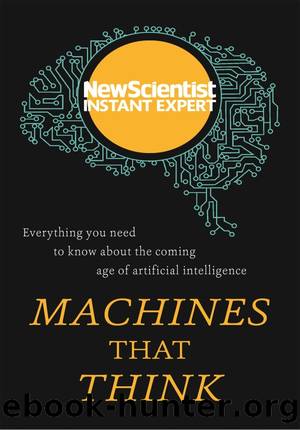Machines that Think by New Scientist

Author:New Scientist
Language: eng
Format: epub
Publisher: Quercus
Published: 2017-08-18T00:00:00+00:00
The right to dignity
The idea is deeply divisive, however. For many, the prospect of a computer chip having the power of life or death over someone is discomforting. According to Christof Heyns, the UNâs Special Rapporteur on extrajudicial, summary or arbitrary executions, it could contravene humanitarian law and the human right to dignity.
âHumans need to be quite closely involved in the decision for it not to violate your human dignity,â says Heyns. He notes that a robotâs targets donât have the option of an appeal to humanity the way they might if a person was behind the weapon. It would be like being exterminated, he says. Remote-controlled drones already give little opportunity to make such appeals. But they at least have a human operator, however distant, who can make ethical judgements. âThe hope that this is possible is at least not completely absent,â says Heyns. âAnd hope is part of a dignified life.â
Ultimately, Heyns is wary of what he calls the âdepersonalization of forceâ. In a 2013 report to the UN, he warned that âtireless war machines, ready for deployment at the push of a buttonâ could lead to a future of permanent conflict. If governments donât have to put boots on the ground, going to war could become too easy. Even in scenarios where machines fight machines, significant collateral damage could destroy a nationâs infrastructure. And as casualty numbers will be lower, wars could go on for longer, preventing post-war reconstruction.
Noel Sharkey, an AI and robotics researcher at the University of Sheffield, UK, and a leading member of the Campaign to Stop Killer Robots, has been trying to bring the issue to international attention for nearly a decade. A key driver of his dogged campaigning is his awareness of the shortcomings of current technology. While Arkin has an eye on next-generation technology, Sharkey is concerned with the present. âI could make you a killer robot within weeks that detects human body signatures and fires at them,â he says. âThe problem is being able to discriminate between a civilian and a combatant.â
Bottling that ability is hard. Aralia Systems is a UK-based firm that provides image-analysing software for security applications. It can highlight suspicious activity in CCTV footage, for example. In 2015 the system flagged up the activity of a group of people who were later found to have been scoping out a public area for a suitable place to plant a bomb. The individuals were apprehended and successfully prosecuted, says Wright. But the companyâs co-founder, Glynn Wright, readily admits that making snap decisions in busy urban environments is a long way off.
Download
This site does not store any files on its server. We only index and link to content provided by other sites. Please contact the content providers to delete copyright contents if any and email us, we'll remove relevant links or contents immediately.
| Drafting & Mechanical Drawing | Fluid Dynamics |
| Fracture Mechanics | Hydraulics |
| Machinery | Robotics & Automation |
| Tribology | Welding |
Whiskies Galore by Ian Buxton(41972)
Introduction to Aircraft Design (Cambridge Aerospace Series) by John P. Fielding(33108)
Small Unmanned Fixed-wing Aircraft Design by Andrew J. Keane Andras Sobester James P. Scanlan & András Sóbester & James P. Scanlan(32781)
Craft Beer for the Homebrewer by Michael Agnew(18220)
Turbulence by E. J. Noyes(8009)
The Complete Stick Figure Physics Tutorials by Allen Sarah(7358)
Kaplan MCAT General Chemistry Review by Kaplan(6918)
The Thirst by Nesbo Jo(6913)
Bad Blood by John Carreyrou(6602)
Modelling of Convective Heat and Mass Transfer in Rotating Flows by Igor V. Shevchuk(6422)
Learning SQL by Alan Beaulieu(6266)
Weapons of Math Destruction by Cathy O'Neil(6251)
Man-made Catastrophes and Risk Information Concealment by Dmitry Chernov & Didier Sornette(5982)
Digital Minimalism by Cal Newport;(5741)
Life 3.0: Being Human in the Age of Artificial Intelligence by Tegmark Max(5534)
iGen by Jean M. Twenge(5399)
Secrets of Antigravity Propulsion: Tesla, UFOs, and Classified Aerospace Technology by Ph.D. Paul A. Laviolette(5360)
Design of Trajectory Optimization Approach for Space Maneuver Vehicle Skip Entry Problems by Runqi Chai & Al Savvaris & Antonios Tsourdos & Senchun Chai(5056)
Pale Blue Dot by Carl Sagan(4986)
